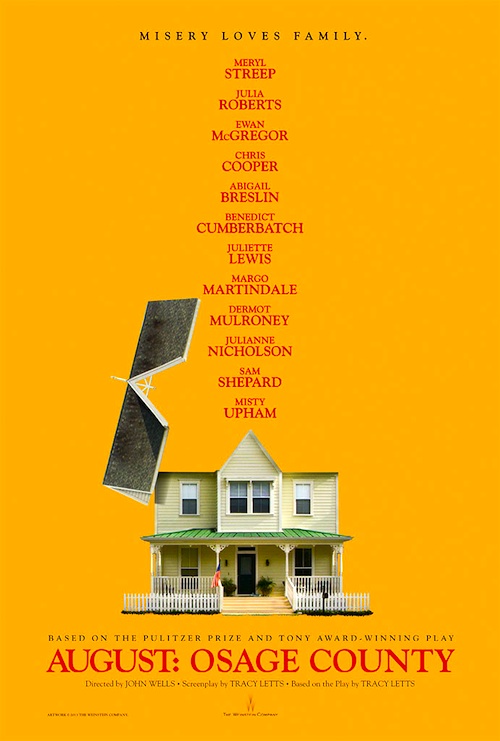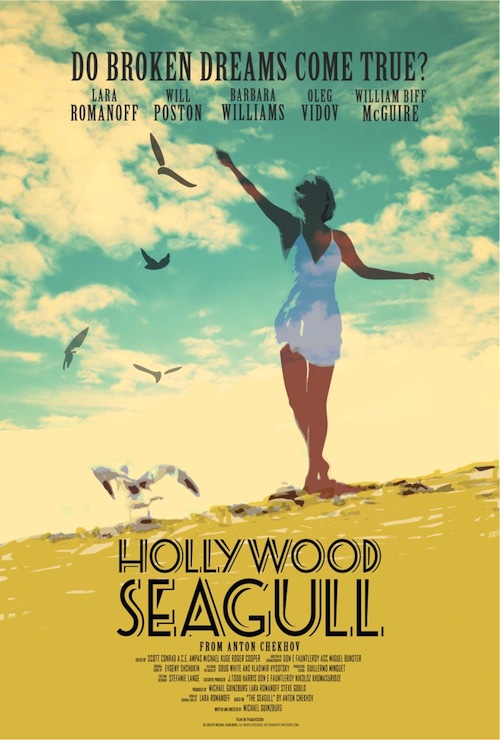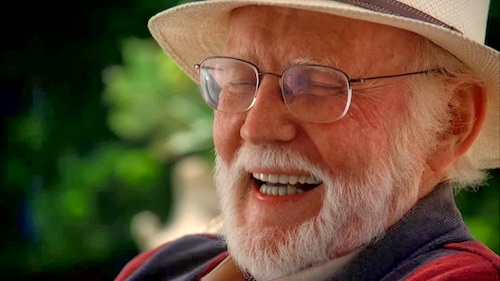By Joe Bendel. The original Broadway production of Tracy Letts’ August: Osage County dominated the Tonys, netting best play, best lead actress for Deanna Dunagan, best featured actress for Rondi Reed, best director for Anna D. Shapiro, and another lead actress nomination for Amy Morton. Aside from Letts adapting his play for the screen, none of the Tony winners would reprise their roles in the movie version. Instead, it was clearly conceived as an Oscar vehicle for a number of formerly popular stars. Prepare for a lot of yelling and drawling when the John Wells helmed August: Osage County opens today in New York.
Pill-popping Violet Weston was a terrible mother to her grown children and remains a thoroughly rotten human being in her twilight years. Even the onset of mouth cancer has not moderated her nasty temperament. It seems she finally drove her beloved and despised husband Beverly to suicide, but the ambiguous circumstances leave some room for denial. After his funeral, the extended family gathers for a memorial dinner. The main course will be recriminations, followed by bile for desert.
Like it or not, everyone is there. Ivy is the mousey daughter who never got out from under Mother Weston’s thumb. Karen is the family’s Blanche Dubois, who has brought along her next prospective sugar daddy hubby. Barbara Weston is the only daughter Violet ever respected, because she has some backbone and attitude. Unfortunately, her relations are currently strained with her unfaithful husband and their moody tweener daughter. As if that were not enough, Weston’s sister Mattie Fae Aiken (sort of a Violet-lite) will also be in attendance, along with her laidback husband Charlie, and their awkward son Little Charles, upon whom she constantly rains down emotional abuse. The cooking and serving will be done by Johnna Monevata, the Native American domestic Beverly hired shortly before his misadventure. If a fire broke out in the house, she would be the only one you would save.
 As the film starts, Sam Shepard’s wonderfully understated near-cameo as Beverly Weston suggests we are in for an acting showcase. Then Meryl Streep shuffles in, like Dwight Frye in a Dracula movie and all hope of subtlety is thrown out the window. Seriously, there has to be a chapter of Overactors Anonymous in Hollywood. Admitting there is a problem is always the first step (I’ve heard there are eleven more after that), but it’s never going to happen until critics and guilds stop hyping every Streep performance just because they’re supposed to. There are times you think Streep will end a scene by loudly proclaiming “Acting!” like Jon Lovitz’s thespian character on Saturday Night Live. The way she masticates the furniture will give audiences indigestion.
As the film starts, Sam Shepard’s wonderfully understated near-cameo as Beverly Weston suggests we are in for an acting showcase. Then Meryl Streep shuffles in, like Dwight Frye in a Dracula movie and all hope of subtlety is thrown out the window. Seriously, there has to be a chapter of Overactors Anonymous in Hollywood. Admitting there is a problem is always the first step (I’ve heard there are eleven more after that), but it’s never going to happen until critics and guilds stop hyping every Streep performance just because they’re supposed to. There are times you think Streep will end a scene by loudly proclaiming “Acting!” like Jon Lovitz’s thespian character on Saturday Night Live. The way she masticates the furniture will give audiences indigestion.
Her more-is-never-enough approach sort of works during the big dinner time smackdown. However, Julia Roberts deserves credit for hanging with her without going wildly over the top. Frankly, it looks like she is manhandling Streep for real at one point, which provides a degree of viewer satisfaction. When Roberts and Streep go at it, the movie starts to click. Unfortunately, this natural peak comes about midway through the film. Every predictable family revelation that follows feels like a letdown.
Still, Roberts’ work is consistently strong throughout the film. She also has some fine support from Chris Cooper, Julianne Nicholson, and Misty Upham as Big Charlie, Ivy Weston, and Johnnna Monevata, respectively. It is worth noting that these are quieter, more reflective and nuanced turns. In contrast, Benedict Cumberbatch proves sometimes less really is less, disappearing into the background as poor put-upon Little Charles.
When you see the film version of Osage, it is easy to understand why it was successful on-stage. Perhaps Streep’s unrestrained performance would work better in that venue, if you were hard of hearing and sitting in the back row of the balcony. On film, it is destined to rank alongside Faye Dunaway’s Joan Crawford in Mommie Dearest. (Violet probably doesn’t dig wire hangers, either.) There is a lot of good work in the film version, but ultimately it is structurally unbalanced and fatally overwhelmed by its excess Streepness. Only satisfying for diehard Roberts fans, August: Osage County opens today (12/27) in New York at the Loews Lincoln Square and the Regal Union Square.
LFM GRADE: C-
Posted on December 27th, 2013 at 11:25pm.

